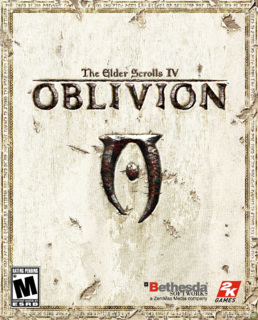As a stand-alone game, it's magnificant. As a sequel to Morrowind, not so good.
As a result of those features and more, the graphics in Oblivion are nothing short of impressive. However the game's programming in this department leaves a lot to be desired. First off, Oblivion does not scale well on the PC. If you do not have the latest and greatest hardware, you will suffer from long loading times and low framerates.
It is understandable that Oblivion cannot run in all it's visual glory with anything less than state of the art hardware. However, even with graphical settings turned down, it is very difficult to get the game to run at an acceptable speed on slow hardware. Half-Life 2 and Valve's source engine demonstrated that you do not have to sacrifice the ability to run on older hardware in order to have state of the art graphics.
Furthermore, on nVidia graphics cards, the afforementioned HDR lighting cannot be used in conjunction with anti-aliasing (a video rendering technique that smoothes out the rough edges of lines). This is partially in part due to architecteral limitations of nVidia's current graphics cards, but also in part due to limitations in Oblivion's coding.
There are ways to allow anti-aliasing and HDR lighting at the same time on nVidia's cards, Bethesda has simply chosen not to make the effort to do so. A third party has already demonstrated how to do HDR that works with anti-aliasing using a program that consists of 50 lines of code. It is appalling that Bethesda could not have taken the time to do such.
One new feature that Oblivion has is full voice-overs of all dialog. In Morrowind, all dialog was text based. This does add realism in some cases but it also limits the amount of interaction with other characters in the game. Whereas in Morrowind, the average character had 10-15 topics of conversation, in Oblivion there are only 4 or 5. Furthermore, only a handful of voice actors were used so everyone sounds the same.
The gameplay in Oblivion is another mixed bag. In someways, the gameplay has improved but much has been sacrified in order to make the game more mainstream.
For starters, there is the quest arrow. Whenever you got a quest in Morrowind, you were given directions by the character who gave you the quest and it was up to you to find the location. In Oblivion, an arrow appears on the compass to guide you to the quest location. In theory, this is a pretty good idea. In practice, it's overdone to the extent that it's more like a constant hand-holding. For example, there is more than one quest where the player is given the task of investigating something such as a murder and the arrow guides the player right to the people they are susposed to interview. I do not mind the arrow guiding me towards directions given by another character, but I do not like the idea of having it solve puzzles for me.
Another area where the game has been "mainstreamed" is combat. Morrowind had a complex combat system with multiple damage types, not only for spells but weapons. In Oblivion, each weapon only has a single damage type and there are a lot less spells. The combat system has gone from a statistics-based system where your characters skill determined how much damage you did and if you hit to a twich based system.
One of the most irritating aspects of this new system is the recoil. Every so often, when your character gets hit by an enemy for anything over a moderate amount of damage, your character recoils and gets thrown back. In first-person mode, this effect is very disorienting and can induce motion sickness in some people. Bethesda has provided no way to turn it off.
Furthermore, theres the skills. In Oblivion, the total amount of skills has been reduced. Instead of short blades and long blades, you simply have blades. There is no medium armor, just heavy and light. Enchanting has been reduced to a benefit of being a member of the mages guild and is useless. By reducing the amount of skills, Bethesda has taken a lot of challenge out of building a character that has a well rounded set of skills.
Finally, there is the main quest. In my opinion, it was too short and too repetitive. Without getting into too much detail, a good deal of the main quest involves the player "closing down" Oblivion gates, which are portals into the Elder Scroll's equivilant of hell. In order to close down the gate, you must venture into it and to the top of the tower inside the realm it leads to. It was fun the first and second times. The concept started to get old around gate 5. By the end of the main story, I had closed down 10 Oblivion gates. The main story does have great voice acting, courtesy of the likes of Patrick Stewart and Sean Bean, and it does have a great ending. But the story itself was too short.
In it's own right, Oblivion is a good game. However, as a sequel to Morrowind, it fails on many levels. If one forgets the fact that Oblivion is susposed to be a sequel to Morrowind and plays it for what it is, then it can be a very enjoyable experience. However, if one plays it as a sequel to Morrowind, it will most likely be a let down.
Don't get me wrong, Oblivion is a great game. But it could have been much more. Bethesda joined the recent industry trend of focusing more on vanity such as graphics and voiceovers than on actual gameplay. However, graphics are not what make a game. Content and gameplay are.

